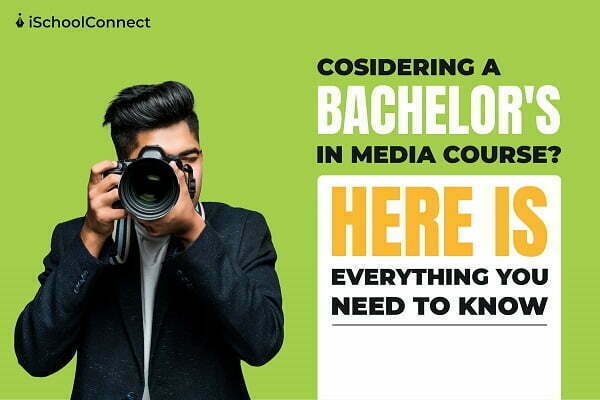Table of Contents
- 1. Today’s media culture
- 2. What does a Bachelor in Media course teach you?
- 3. What is a Bachelors in Media?
- 4. The 4 key concepts in Media studies
- 5. What are the subdisciplines in Media studies?
- 6. What are the top universities for a Bachelor in Media?
- 7. What to expect from a Bachelor in Media course?
- 8. What can you do with a Bachelor in Media degree?
- 9. Are Media Bachelor degrees worth it?
With an increase in the number of platforms and consumers, there is high competition among organizations to provide quick and relevant information. Media is everywhere and everyone in the world has access to it. It is the most powerful tool in today’s time. And if that’s something that interests you, a Bachelor’s in Media is the right choice for you. Here is a complete guide on everything you need to know about pursuing a Bachelor in Media course abroad.
1. Today’s media culture
Media has taken many forms. In addition to print media, cinema, and broadcasting, there is digital media, advertising, OTT, and video games, etc. We engage with all these different channels on a daily basis and form opinions and ideas based on what we consume. Therefore, media has the ability to impact people greatly.
2. What does a Bachelor in Media course teach you?
While Media studies is an extensive field, the core teachings of each discipline show you how to-
- Discover and share relevant information
- Understand the working of media organizations, and
- Find a niche, where you can make a positive impact
3. What is a Bachelors in Media?
The curriculum of Media courses is enormous. The subjects deal with history, content, and the influence of different collective communication tools and methods, with mass media as the primary focus. A Bachelor in Media course includes theoretical topics like-
- The history of mass media
- The social impact of media
- Communication theory
- Development of new media, and more
The course also requires a lot of practical and hands-on experience.
Many schools offer dual degrees in media and other subjects. There are also schools that teach vocational courses. These courses focus on specialized practical skills such as the process of production in media, and efficient writing and editing techniques, etc.
For the first 2 years, the curriculum for a Bachelor’s degree in Mass Media focuses on a mix of theoretical and practical knowledge, while the final third (and, in some colleges, the fourth) year is dedicated to gaining work experience. Students have to apply for internships and build their profiles. Some colleges also allow you to choose specializations of your choice like advertising, journalism, public relations, or film studies, etc.
Read more: Bachelors in USA: Top Universities, Courses, Cost, Eligibility

4. The 4 key concepts in Media studies
Content creation lies at the heart of Media. And it’s no easy task to create information in a way that audiences find attractive and useful. The 4 concepts in Media studies revolve around accomplishing this-
- Institution. The institutions create media, analyze the impact of their ideology and funding on their work.
- Viewers. This involves understanding the audience that consumes media, and creating content in relevance to your target group.
- Representation. Different media institutions interpret and report an event or situation differently.
- Media language. Different ways in which you can circulate a story or a message via text, audio, image, or video, etc.
5. What are the subdisciplines in Media studies?
As mentioned above, media studies in general cover disciplines like psychology, anthropology, political science, and cultural studies. With such a vast subject, you need to take time to discover your niche and then choose to specialize in any of the media subdisciplines-
- Communication
- Publishing and editing
- Social media
- Journalism
- Film and Advertising, and more
6. What are the top universities for a Bachelor in Media?
Several universities around the world offer Bachelor in Media courses with multiple specialization options. Some of the top universities to pursue a Bachelor in Media are-
- University of Amsterdam
- University of Southern California
- The London School of Economics and Political Science (LSE)
- University of Texas at Austin
- Stanford University
- Nanyang Technological University, Singapore (NTU)
- New York University (NYU)
- University of Pennsylvania
- The University of Wisconsin-Madison
- University of California, Berkeley (UCB)
7. What to expect from a Bachelor in Media course?

Media is divided into 2 main categories-
- Traditional/legacy media. This includes radio, television, print media, etc.
- Contemporary media. This comprises of social media, video games, movies, etc.
During a Media studies course, you will get to analyze different media channels and institutions. You’ll learn to compare the past and the present and explore the changes in the functioning of media organizations over time. Subjects like online advertising, and smartphone culture, and the way they have changed our offline and online communication may also be included in the curriculum.
8. What can you do with a Bachelor in Media degree?
A Bachelor in Media graduate can get jobs in marketing, broadcasting, photography, PR, production, web content, graphic designing, etc. Below is the list of some of the popular media studies careers-
Web content manager
A website content manager ensures that the content of a website like articles, reviews, images, videos, etc. has a clear structure to it. They must also ensure that the content meets the quality standards and needs of the users.
Digital marketing specialist
Digital marketing specialists help clients grow their brand through awareness and online promotion of their products and services. Their expertise lies in handling and optimizing all the online media channels of the brand to cater to the target audience.
Media planner
Media planners analyze data and carry out research to create a plan of action and devise strategies for advertising campaigns.
Public relations specialist
A public relations specialist creates and nurtures a favorable image of their client, so they can appeal to the target audience.
Television/film/video producer
In the television, film, or video setup, producers secure the funding for projects and make sure that the production is done within the allocated budget. They also work closely with directors and other production staff to ensure the smooth running of a project.
These are just some profiles you can explore. A Bachelor’s in Media degree offers a vast scope of career options and you can find unique ways to implement everything you learn. It is, however, important to first discover your niche and then think about how you can combine the two.
9. Are Media Bachelor degrees worth it?
Absolutely! We live in a world overwhelmed with information. There is an urge to know and to explore. From the creative arts to news, informational content, to even posting about your life experiences, everything is monetized. There is so much to explore and the freedom to create and express. You can pursue so many avenues in the media industry for a successful and fulfilling career in the field.






